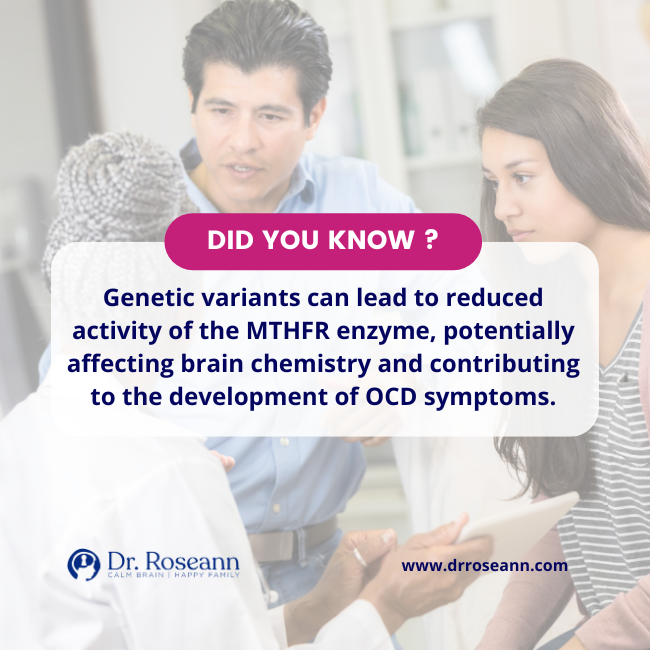Learning about Obsessive Compulsive Disorder (OCD) also involves unraveling the connection between genetic factors and the development of this mental health condition. So, is OCD genetic? Let's discuss that and the onset of OCD.
Genetics, often deemed as the hand we're dealt with at birth, contributes to the development of OCD. Beyond the surface of environmental influences, a complex interplay of genetic components shapes the onset and progression of OCD symptoms.
>> Get to the bottom of your child's issue.
Take the Brain Map Assessment today! <<
Recent findings on neurodevelopmental disorders and mental health conditions point to a significant genetic basis for OCD. Researchers using tools like genome-wide association studies and doing investigations into single-nucleotide polymorphisms are uncovering specific genes that bear relevance to the occurrence of OCD (Pauls, 2010).
These genes that are intricately woven into the fabric of our DNA hold clues to understanding the origins of intrusive thoughts, compulsive behaviors, and the overall behavioral manifestations associated with OCD.
The identified genetic markers provide not only a glimpse into the hereditary nature of OCD but also shed light on the neurological foundations of the disorder. Brain scans and studies into the basal ganglia, a region associated with motor control and procedural learning, offer insights into the role of genetics in shaping the brain structure and circuitry involved in OCD development (Rapoport, 1990).
Specific genes associated with neurotransmitter regulation, serotonin reuptake inhibitors, and neurodevelopmental pathways also contribute to OCD development. Environmental factors also play a role and, along with the genetic component, are paramount for a comprehensive grasp of the disorder.
Twin and Family Studies on OCD
Twin studies involving identical (monozygotic) and fraternal (dizygotic) twins, serve as valuable tools in unraveling the genetic puzzle. By comparing the prevalence of OCD within these twin pairs, researchers aim to tease apart the influence of genetic factors from environmental ones.
The findings from twin studies reveal intriguing patterns. Identical twins, who share nearly 100% of their genetic material, often exhibit a higher concordance rate for OCD compared to fraternal twins (Van Grootheest et al., 2005).
This discrepancy suggests a substantial genetic contribution to the development of OCD. Additionally, family studies extend this exploration beyond twins, encompassing first-degree relatives and shedding light on the familial transmission of OCD.
The heritability of OCD is evident but it's crucial to recognize that environmental factors also play a role. Twin and family studies allow us to appreciate the intricate relationship between nature and nurture. Environmental influences, life experiences, and shared familial environments contribute to the unique expression of OCD within families.
The Genetics of Obsessive Compulsive Disorder
Genetic testing provides a window into a child’s genetic makeup as it offers insights into specific genes associated with OCD risk. It involves analyzing the child’s DNA to identify variations or mutations that may contribute to the possibility of developing OCD.
This process, conducted through sophisticated techniques such as genome-wide studies and investigation into single-nucleotide polymorphisms, holds the promise of uncovering the genetic markers intricately linked to OCD development.
However, ethical considerations also come to the forefront. Genetic testing for OCD raises questions about the potential psychological impact on children and families. But despite that, the revelation of genetic predispositions can be a double-edged sword because it provides valuable information for early intervention though it might pose challenges in terms of psychological well-being.
Genetic counseling can help in addressing these ethical considerations as it can provide support and guidance to individuals and families as they navigate the implications of genetic testing.
Genetic counseling emerges as a compass that guides children and families through the terrain of genetic information. Informed decision-making allows parents to understand the implications of their genetic makeup on OCD risk.
This process involves not only deciphering the results of genetic testing but also exploring the potential impact on treatment options, preventive measures, and family planning. It empowers parents to make choices aligned with their values and preferences to foster a sense of control in the face of genetic complexities.
Genetic Variants and OCD
Among the genetic contributors, common genetic mutations, including variations in the MTHFR gene, have garnered significant attention. The MTHFR gene is crucial for methylation processes in the body, affecting neurotransmitter synthesis and DNA repair. Variations in this gene, such as C677T and A1298C, have been explored for their potential links to various psychiatric disorders, including OCD.

However, it's important to emphasize that no single gene, including MTHFR, determines the presence of OCD. Instead, it is likely that a combination of multiple genes and their interactions with environmental factors contribute to the risk. Other genetic variants implicated in OCD are those related to the serotonin system, which plays a key role in mood regulation and is a common target for OCD medications.
The complexity of OCD genetics necessitates a nuanced approach, recognizing the multifactorial nature of this disorder, including brain inflammation.
Brain Inflammation and Its Connection to OCD

The link between brain inflammation and Obsessive-Compulsive Disorder (OCD) is a growing area of research, offering new insights into the disorder's biological basis. Studies have found elevated levels of inflammatory markers in individuals with OCD and identified changes in brain regions associated with inflammation. These areas, like the orbitofrontal cortex and basal ganglia, are crucial in controlling compulsions and processing fear.
Inflammation disrupts neurotransmitter balance or directly affects brain circuits involved in OCD. Conditions such as PANS, PANDAS, and autoimmune encephalopathy result from a misdirected immune response that leads to inflammation-induced cognitive and psychiatric symptoms, including in some cases, OCD.
Implications for Treatment and Prevention
Understanding genetic factors holds for effective treatment and prevention. While genetics undoubtedly plays a role in shaping OCD, it doesn't define the journey. With insights from twin studies, family analyses, and genetic testing, we can embark on a personalized approach to treatment.
This involves tailoring interventions based on the specific genetic markers associated with their OCD risk. Whether it's cognitive-behavioral therapy, neurofeedback, PEMF therapy, or other natural science-backed treatments, a clear understanding of genetic factors allows for a more targeted and effective treatment plan.
Knowledge is power when it comes to mental health. This knowledge not only reduces stigma but also fosters a sense of control over one's mental well-being while gaining a deeper awareness of the factors influencing mental health.
Parents should know that the genetic landscape isn't a predetermined path. It's a map that can guide preventive measures. Identifying genetic risk factors through testing lets us proactively implement strategies to contain the impact of OCD.
Early intervention through genetic insights becomes a powerful tool in preventing the onset or progression of OCD symptoms. This could involve strategies to address issues, such as anxiety disorder or even other possible psychiatric disorders, tailored to a child’s unique genetic profile.
In mental health, a holistic approach often yields the most significant results. It combines lifestyle factors, stress management, and overall well-being. Acknowledging the role of genetics allows parents to adopt a holistic approach that addresses the multifaceted nature of OCD and promotes a balanced and resilient mental health journey.
Parent Action Steps
☐ Understand the connection between genetics and how kids develop OCD.
☐ Keep abreast of research using tools like genome-wide association studies.
☐ Actively participate in the process of deciphering genetic testing results.
☐ Work with healthcare professionals to address issues like repetitive behaviors.
☐ Do lifestyle modifications, therapeutic interventions, and stress and management.
☐ Take the OCD Quiz to get solutions for your child’s obsessions and compulsions.
☐ Work 1-on-1 with Dr. Roseann through the BrainBehaviorResetTM Program.
Citations
Pauls, D. L. (2010). The genetics of obsessive-compulsive disorder: a review. Obsessive-Compulsive Spectrum Disorders, 12(2), 149–163. https://doi.org/10.31887/dcns.2010.12.2/dpauls
Rapoport, J. L. (1990). Obsessive Compulsive Disorder and Basal Ganglia Dysfunction. Psychological Medicine, 20(3), 465–469. https://doi.org/10.1017/s0033291700016962
Van Grootheest, D. S., Cath, D. C., Beekman, A. T., & Boomsma, D. I. (2005). Twin Studies on Obsessive–Compulsive Disorder: A Review. Twin Research and Human Genetics, 8(5), 450–458. https://doi.org/10.1375/twin.8.5.450
Dr. Roseann is a Children’s Mental Health Expert and Licensed Therapist who has been featured in/on hundreds of media outlets including The Mel Robbins Show, CBS, NBC, PIX11 NYC, Today, FORBES, CNN, The New York Times, The Washington Post, Business Insider, Women’s Day, Healthline, CNET, Parade Magazine and PARENTS. FORBES called her, “A thought leader in children’s mental health.”

She coined the terms, “Re-entry panic syndrome” and “eco-anxiety” and is a frequent contributor to media on mental health.
Dr. Roseann Capanna-Hodge has three decades of experience in working with children, teens and their families with attention-deficit hyperactivity disorder (ADHD), autism, concussion, dyslexia and learning disability, anxiety, Obsessive Compulsive Disorder (OCD), depression and mood disorder, Lyme Disease, and PANS/PANDAS using science-backed natural mental health solutions such as supplements, magnesium, nutrition, QEEG Brain maps, neurofeedback, PEMF, psychotherapy and other non-medication approaches.
She is the author of three bestselling books, It’s Gonna Be OK!: Proven Ways to Improve Your Child's Mental Health, The Teletherapy Toolkit, and Brain Under Attack. Dr. Roseann is known for offering a message of hope through science-endorsed methods that promote a calm brain.
Her trademarked BrainBehaviorResetⓇ Program and It’s Gonna be OK!Ⓡ Podcast has been a cornerstone for thousands of parents facing mental health, behavioral or neurodevelopmental challenges.
She is the founder and director of The Global Institute of Children’s Mental Health, Neurotastic™Brain Formulas and Dr. Roseann Capanna-Hodge, LLC. Dr. Roseann is a Board Certified Neurofeedback (BCN) Practitioner, a Board Member of the Northeast Region Biofeedback Society (NRBS), Certified Integrative Mental Health Professional (CIMHP) and an Amen Clinic Certified Brain Health Coach. She is also a member of The International Lyme Disease and Associated Disease Society (ILADS), The American Psychological Association (APA), Anxiety and Depression Association of America (ADAA) National Association of School Psychologists (NASP), International OCD Foundation (IOCDF).
© Roseann-Capanna-Hodge, LLC 2023










